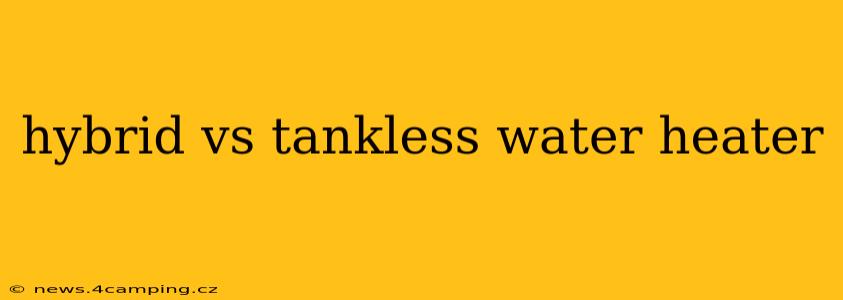Choosing the right water heater can significantly impact your home's comfort, energy efficiency, and long-term costs. Two popular options vying for your attention are hybrid (heat pump) water heaters and tankless (on-demand) water heaters. Both offer advantages over traditional tank water heaters, but understanding their differences is crucial for making the best decision. This comprehensive guide will delve into the key distinctions between hybrid and tankless water heaters, helping you determine which best suits your needs and budget.
What is a Hybrid (Heat Pump) Water Heater?
A hybrid water heater, also known as a heat pump water heater, uses electricity in a highly efficient way to heat water. Unlike traditional electric water heaters that use resistance heating, a hybrid water heater extracts heat from the surrounding air and transfers it to the water. This process results in significantly lower energy consumption compared to both traditional electric and gas tank water heaters.
Advantages of Hybrid Water Heaters:
- High Energy Efficiency: The most significant advantage is their superior energy efficiency, often boasting Energy Factor (EF) ratings much higher than other types. This translates to lower electricity bills.
- Lower Operating Costs: Long-term cost savings are substantial due to reduced energy consumption.
- Environmentally Friendly: Their efficiency contributes to a smaller carbon footprint compared to traditional electric water heaters.
- Quiet Operation: Heat pump water heaters are generally quieter than tankless water heaters.
Disadvantages of Hybrid Water Heaters:
- Higher Initial Cost: Hybrid water heaters typically have a higher upfront cost than standard tank or tankless models.
- Space Requirements: They usually require more space than a standard tank water heater.
- Ambient Temperature Dependence: Efficiency can decrease in extremely cold climates.
- Not Ideal for High-Demand Households: While improving, they might struggle to provide hot water consistently for very large families or those with high hot water usage.
What is a Tankless (On-Demand) Water Heater?
A tankless water heater, also known as an on-demand water heater, heats water only when you need it. Unlike storage tank water heaters, they don't store hot water, eliminating standby heat loss. They can be gas-powered or electric.
Advantages of Tankless Water Heaters:
- Unlimited Hot Water: They can provide a continuous supply of hot water, making them ideal for large families or homes with multiple bathrooms.
- Energy Efficient (Potentially): While not always more efficient than hybrid systems, they are significantly more efficient than traditional tank water heaters, especially if you don't use much hot water. Energy efficiency varies depending on fuel type and usage patterns.
- Longer Lifespan: With proper maintenance, tankless water heaters can last considerably longer than traditional tank water heaters.
- Space Saving: They are compact and can be mounted on a wall, saving valuable floor space.
Disadvantages of Tankless Water Heaters:
- Higher Initial Cost: Similar to hybrid models, they often have a higher upfront cost.
- Higher Installation Costs: Installation can be more complex and expensive than standard tank water heaters.
- Potential for Lower Flow Rates: Depending on the unit's size and the number of fixtures in use simultaneously, flow rates can be affected.
- Can Be Noisy: Some tankless water heaters can be quite noisy during operation.
- Requires Higher Gas Line Capacity (for gas models): Gas tankless water heaters often require an upgraded gas line to handle the increased demand.
Hybrid vs. Tankless: Which is More Energy Efficient?
This is a complex question with no single answer. Generally, hybrid water heaters are more energy-efficient than tankless water heaters, especially in climates with mild to moderate temperatures. Tankless water heaters excel in situations where hot water demand is sporadic, rather than constant. If you consistently use large amounts of hot water, a high-output tankless system may be less energy-efficient than a hybrid system, due to the continuous heating process required to meet demand. The best way to determine which is more efficient for your home is to perform a thorough energy audit or consult with a qualified plumber or HVAC professional.
Which Type of Water Heater is Best for My Home?
The ideal choice depends on several factors:
- Your budget: Consider both the initial cost and long-term operating costs.
- Your hot water usage: High-demand households might benefit from a tankless system or a high-capacity hybrid.
- Your climate: Hybrid systems are particularly efficient in milder climates.
- Your home's gas and electrical infrastructure: Gas tankless heaters may require upgrades.
- Available space: Hybrid systems generally require more space than tankless systems.
It is highly recommended to consult with a qualified plumber or HVAC professional to assess your specific needs and determine the most suitable water heating solution for your home.
How long do hybrid and tankless water heaters last?
Both hybrid and tankless water heaters boast longer lifespans than traditional tank water heaters. Tankless water heaters typically last 20 years or more with proper maintenance, while hybrid heat pump water heaters have a lifespan averaging 10-15 years. Regular maintenance, including flushing and cleaning, is crucial to extending the lifespan of both types.
Are hybrid and tankless water heaters worth the cost?
The cost-effectiveness of hybrid and tankless water heaters depends on individual circumstances. The higher initial cost is often offset by significant long-term energy savings, particularly for hybrid models in suitable climates. For households with high hot water demand, a tankless or high-capacity hybrid may be a worthwhile investment, despite the initial expense. A thorough cost-benefit analysis tailored to your specific needs is crucial before making a decision.
By carefully considering these factors and consulting with a professional, you can confidently choose the water heater that best meets your home’s needs and provides optimal performance and long-term value.
